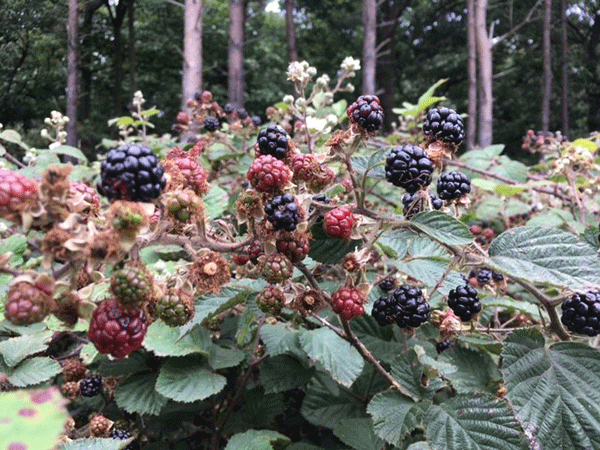At this time of year I always go ‘brambling’, but it wasn’t until I looked into the history and science of foraging that I realised just how powerful picking blackberries can be.
The best place I know for brambles is near a little town in East Lothian called Haddington. I was vaguely aware that in the 16th Century the area was part of a witchcraft ‘outbreak’.
Innocent women were persecuted for speaking in demonic tongues and casting spells on their neighbours. What I was not aware of was that one of their crimes was ‘hedgerow witchcraft’ or the foraging for medicines from wild plants for everything from childbirth to depression.
Today a lot of people still forage in hedgerows and thankfully none of us are burned at the stake. But there is still a sense of the subversive. Foraging for food is one of the few ways we can sever reliance on the established food and medical system. It is seen as a little bit wild, a little bit dangerous; there is even still a connection to witchcraft.

In her wonderful book A Spell in the Wild, Alice Tarbuck, who describes herself as a modern day ‘witch’, guides the reader through some of the ways we can reconnect to our pagan roots. Part of her practice is to gather wild plants for their medicinal properties, as well as for the feelings of empowerment and freedom it gives her identifying and gathering her own food and medicine.
It is well known that wild foods like blackberries and rosehips are packed with vitamin C. But is there something even more powerful going on?
Wendy Russell, a professor of molecular nutrition at The Rowett Institute in Aberdeen, and certainly not a witch, thinks so. She explains that, as well as the vitamins and minerals identified by science, there are potentially millions of phytochemicals in wild plants we do not yet know about.
These micronutrients could hold the key to improving our health and even treat non-communicable conditions like diabetes. For example, blackberries are packed full of anthocyanins, that give the fruit its purple colour and could protect against cancer.
A study carried out at The Rowett Institute found the 20 most-foraged plants in Scotland all contain high quantities of phytochemicals. Comparisons between wild cabbage and domesticated cabbage found the wild cabbage had far more phytochemicals. Prof Russell wants to bring some of these micronutrients in wild plants back into our diets through growing wild plants on marginal land, and reintroducing some of the genetics of wild plants back into our domesticated breeds.

There are also the mental health benefits in foraging. Recent studies have found that being outside in nature and gathering plants can improve your state of mind. One study at the University of Oregon found fractal shapes in nature like snowflakes and flowers can be soothing. Why not the sepals of a rosehip or the seeds on a blackberry? Another study from Japan found that forest bathing, the process of taking a mindful, multi-sensory walk in the woods, i.e. something very similar to foraging, can reduce stress.
As I set out to forage over this autumn equinox, I will be noticing the change in temperature, the leaves turning and the smell of the earth. I will be using all my senses to spot the red haws in the hedgerow, hear the robins singing and taste the sweetest blackberries. Best of all I will share my bounty with my friends when I get home. For me that feels like magic.
What is magic about foraging for you?












0 Comments